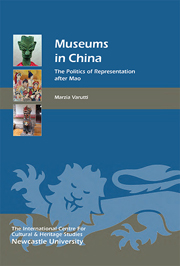Book contents
- Frontmatter
- Contents
- List of Illustrations
- Acknowledgments
- Chronology
- List of Abbreviations
- Introduction
- 1 Cultural Heritage in China
- 2 Museums in China: origins and Development
- 3 New Actors in the Chinese Museum World
- 4 Museum objects and the Chinese nation
- 5 The nation in the Museum
- 6 The Politics of the Past
- 7 The Representation of the Past in China's Museums
- 8 The Politics of identity
- 9 The Museum Representation of ethnic Minorities
- 10 Techniques and sites of Display of ethnic Minorities
- Conclusions: The new Museums of China
- Appendix: List of Museums in China Visited by the Author
- Bibliography and References
- Index
- Heritage Matters
6 - The Politics of the Past
Published online by Cambridge University Press: 05 March 2014
- Frontmatter
- Contents
- List of Illustrations
- Acknowledgments
- Chronology
- List of Abbreviations
- Introduction
- 1 Cultural Heritage in China
- 2 Museums in China: origins and Development
- 3 New Actors in the Chinese Museum World
- 4 Museum objects and the Chinese nation
- 5 The nation in the Museum
- 6 The Politics of the Past
- 7 The Representation of the Past in China's Museums
- 8 The Politics of identity
- 9 The Museum Representation of ethnic Minorities
- 10 Techniques and sites of Display of ethnic Minorities
- Conclusions: The new Museums of China
- Appendix: List of Museums in China Visited by the Author
- Bibliography and References
- Index
- Heritage Matters
Summary
This chapter explores the complex relationship that links the Chinese political present to its recent and ancient past. The Chinese political system fits Michel Foucault's definition of ‘discursive regimes’ as ‘systems for managing and policing discourse (who produces or evaluates what will count as true or valid knowledge and what will not, and the conditions of such truth)’ (Hodge and Louie 1998, 10). Within such ‘regimes’, museums are assigned the function of shaping the image of the nation and its past. Yet, while Tony Bennett's (1995) Foucault-inspired paradigm of museums as political tools is not inappropriate in explaining the relationship between the state, museums and society in China, Foucault's approach to museums as disciplinary tools is not entirely satisfactory in the case of China. In China, museums serve more as tools to legitimise political authority, rather than to exercise it. In other words, museums act more as media to promote the government's ideology rather than as an apparatus of control.
The modalities through which museums disseminate official ideology have changed over time. Post-1949, museums aided the spread of Communist ideology and actively participated in the nation-building project. They did so by providing a unified, government-approved vision of Chinese identity, culture and history (notably, revolutionary history), by illustrating the sacrifice of martyrs to the revolutionary cause and by celebrating the accomplishments of the Communist government.
- Type
- Chapter
- Information
- Museums in ChinaThe Politics of Representation after Mao, pp. 89 - 102Publisher: Boydell & BrewerPrint publication year: 2014

